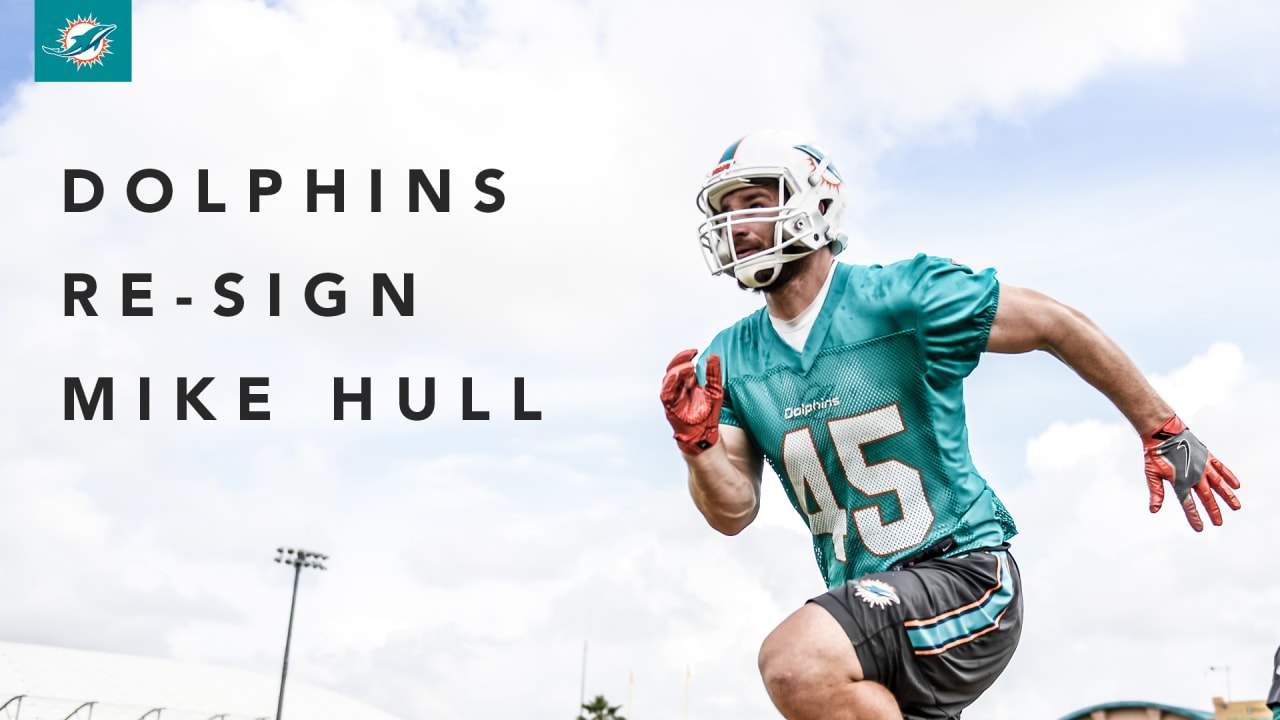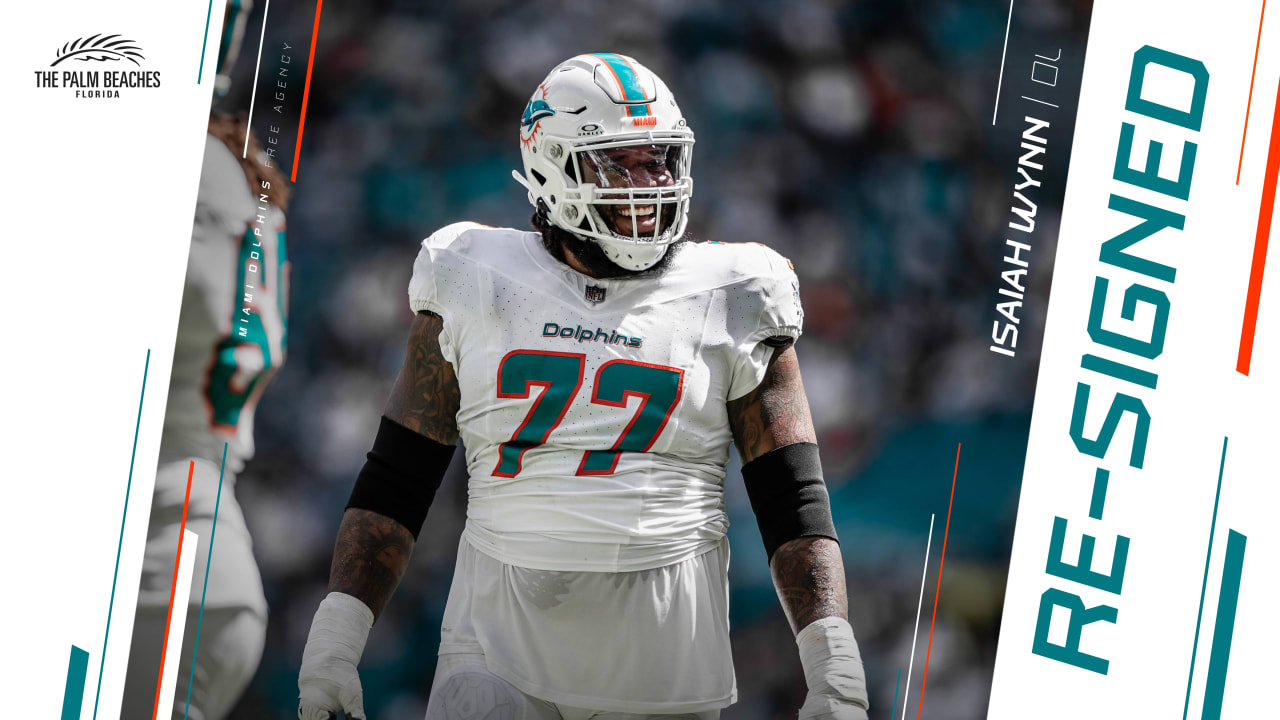When the Miami Dolphins announced they had re-signed their star player for a fraction of his market value, fans were left scratching their heads. How did they manage to pull this off? And what does it mean for the team's future? Let's dive into the details because this move might just turn out to be genius.
Now, if you've been following NFL news lately, you've probably heard the buzz about the Dolphins re-signing one of their key players at an incredibly low cost. On the surface, it seems like a no-brainer—getting a star player for cheap sounds too good to be true. But as we dig deeper, you'll see that there's more to this story than meets the eye.
Before we break it all down, let me just say this: the NFL is a business, and sometimes these moves aren't as simple as they appear. Teams are always looking for ways to maximize their resources while staying within the salary cap. So, did the Dolphins just get lucky, or was this a calculated risk? Let's find out.
Read also:Randy Travis Health 2025 A Deep Dive Into His Journey Challenges And Triumphs
Why the Dolphins Re-signed Their Star on the Cheap
Okay, so here's the deal: the Dolphins re-signing their star player on the cheap wasn't just some random decision. It was a carefully thought-out strategy that could have long-term benefits for the franchise. Let's break it down step by step.
First off, the Dolphins knew they were in a tight spot with the salary cap. They couldn't afford to throw around big money like some of the other teams. But instead of panicking, they got creative. They realized that offering a lower salary with performance-based incentives could be a win-win situation for both the player and the team.
Let's not forget that this star player has a history with the Dolphins. He knows the system, he's comfortable with the coaching staff, and he's already proven himself on the field. That kind of familiarity can be worth its weight in gold. Plus, there's the added bonus of keeping the locker room vibe positive, which is crucial for team chemistry.
How the Move Impacts the Team's Future
Now, you might be wondering, "What does this mean for the Dolphins' future?" Well, it means a lot. By re-signing their star player at a lower cost, the Dolphins have freed up cap space that they can use to address other areas of need. This gives them flexibility in the upcoming offseason, which is a huge advantage.
Think about it: instead of being stuck with a massive contract for one player, the Dolphins can now allocate that money to other positions. They can bring in fresh talent, upgrade their defense, or even sign a veteran quarterback. The possibilities are endless, and that's exactly what makes this move so smart.
Another thing to consider is the message this sends to other players. When a star player is willing to take less money to stay with the team, it shows that he's invested in the franchise's success. That kind of loyalty can be contagious, and it might encourage other players to follow suit.
Read also:Paolo Macchiarini Children A Journey Beyond The Spotlight
The Player's Perspective: Why He Said Yes
Let's flip the script for a second and look at things from the player's perspective. Why would he agree to such a deal? After all, he's a star, and stars usually demand top dollar. But here's the thing: sometimes money isn't everything.
For this player, staying with the Dolphins means continuing to play for a team that believes in him. It means being part of a growing franchise that's building something special. And let's not forget the performance-based incentives we mentioned earlier. If he has a breakout season, he could end up making even more money than he would have with a traditional contract.
Plus, there's the added bonus of stability. Changing teams can be a rollercoaster ride, with new coaching staffs, new systems, and new expectations. Staying put allows him to focus on what he does best: dominating on the field.
Breaking Down the Contract Details
Alright, let's get into the nitty-gritty of the contract. While the exact numbers haven't been fully disclosed, we do know a few key details. The player signed a multi-year deal that guarantees a base salary, but the real money comes from the performance bonuses.
- Base Salary: $X million per year
- Performance Bonuses: $Y million based on specific metrics
- Signing Bonus: $Z million upfront
What's interesting here is how the performance bonuses are structured. They're tied to things like yards gained, touchdowns scored, and even team success. This means that the player has a vested interest in not just his own performance but also the team's overall performance. It's a clever way to align everyone's goals.
The Impact on the Salary Cap
Now, let's talk about the salary cap. For those of you who aren't familiar, the salary cap is a limit on how much money a team can spend on player salaries in a given season. It's a crucial part of the NFL's financial structure, and teams have to be strategic about how they allocate their resources.
By re-signing their star player at a lower cost, the Dolphins have created some much-needed cap space. This gives them flexibility to make other moves, whether it's signing free agents, re-signing their own players, or even trading for additional talent. It's like giving themselves a financial cushion that they can use wisely.
Another benefit is that it allows the Dolphins to avoid potential cap issues down the road. In the NFL, contracts can get complicated, especially when it comes to guaranteed money and dead money. By structuring this deal the way they did, the Dolphins have minimized their financial risk.
What This Means for the NFL Landscape
Let's zoom out for a second and look at the bigger picture. The Dolphins re-signing their star player on the cheap could have ripple effects throughout the NFL. Other teams might start to rethink their approach to contracts, especially when it comes to retaining their own players.
For example, if a star player is willing to take less money to stay with his current team, it could set a precedent for other players to do the same. This could lead to a shift in how teams negotiate contracts, with more emphasis on performance-based incentives and less on guaranteed money.
It also sends a message to teams that are struggling with cap space. Instead of letting their star players walk in free agency, they could explore similar deals that benefit both parties. It's a creative solution to a common problem in the NFL.
How Fans Are Reacting
Fans, as you might expect, have mixed reactions to this move. Some are thrilled that their favorite player is staying put, while others are skeptical about the long-term implications. Social media has been ablaze with opinions, ranging from praise to criticism.
- Positive Reaction: "This is a brilliant move by the Dolphins. They're building for the future!"
- Negative Reaction: "Why is he taking such a pay cut? Is there something we don't know?"
- Neutral Reaction: "It's a good deal for both sides. Let's see how it plays out."
What's clear is that fans are paying attention, and they're not shy about sharing their thoughts. This kind of engagement is great for the league, as it keeps everyone invested in the drama and excitement of the NFL.
Historical Context: Past Moves That Paid Off
History has shown us that sometimes the best moves in sports aren't the flashy ones. They're the ones that fly under the radar, only to reveal their brilliance later on. The Dolphins re-signing their star player on the cheap could be one of those moves.
Think back to some of the legendary deals in NFL history. Teams that took a chance on a player or structured a contract in a unique way often ended up reaping the rewards. The Patriots, for example, were masters at this during their dynasty years. They found ways to keep their star players happy while still maintaining cap flexibility.
The Dolphins could be following a similar playbook. By making this move, they're setting themselves up for success in the long run. It's not about what happens this season; it's about building a sustainable franchise that can compete year after year.
Conclusion: The Dolphins' Move Could Be Genius
In conclusion, the Dolphins re-signing their star player on the cheap is a move that deserves serious attention. It's not just about saving money; it's about creating opportunities for the franchise to grow and thrive. By structuring the deal in a way that benefits both the player and the team, the Dolphins have set themselves up for success.
So, what's next? Keep an eye on how this deal plays out. If the player has a breakout season, it could be the catalyst for the Dolphins' resurgence in the NFL. And who knows? This might just be the move that propels them to the top of the league.
As always, feel free to drop your thoughts in the comments below. Do you think the Dolphins made the right call? Or do you think they're taking a risk? Let's keep the conversation going!
Daftar Isi
- Dolphins Re-sign Star on Cheap: A Sneaky Move That Could Pay Off Big
- Why the Dolphins Re-signed Their Star on the Cheap
- How the Move Impacts the Team's Future
- The Player's Perspective: Why He Said Yes
- Breaking Down the Contract Details
- The Impact on the Salary Cap
- What This Means for the NFL Landscape
- How Fans Are Reacting
- Historical Context: Past Moves That Paid Off
- Conclusion: The Dolphins' Move Could Be Genius


